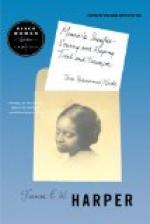“Nothing in particular; only I was down to Mr. Hickman’s this morning, and they have a colored woman stopping with them. She is a very interesting and intelligent woman, and she was telling us part of her history, and it was very interesting, but, mother, I do think it is a dreadful thing to be a colored person in this country; how I should suffer if I knew that I was hated and despised for what I couldn’t help. Oh, it must be dreadful to be colored.”
“Oh, don’t talk so, Minnie, God never makes any mistakes.”
“I know that, mother; but, mother, it must be hard to be forced to ride in smoking cars; to be insulted in the different thoroughfares of travel; to be denied access to public resorts in some places,—such as lectures, theatres, concerts, and even have a particular seat assigned in the churches, and sometimes feel you were an object of pity even to your best friends. I know that Mrs. Heston felt so when she was telling her story, for when Mrs. Hickman said, ‘Well, Sarah, I really pity you,’ I saw her dark eyes flash, and she has really beautiful eyes, as she said, ‘it is not pity we want, it is justice.’”
“In the first place, mother, she is a widow, with five children. She had six. One died in the army,—and she had some business in Washington connected with him. She says she was born in Virginia, and had one little girl there, but as she could not bear the idea of her child growing up in ignorance, she left the South and went to Albany. Her husband was a barber, and was doing a good business there. She was living in a very good neighborhood, and sent her child to the nearest district school.
“After her little girl had been there awhile, her teacher told her she must go home and not come there any more, and sent her mother a note; the child did not know what she had done; she had been attentive to her lessons, and had not behaved amiss, and she was puzzled to know why she was turned out of school.
“‘Oh! I hated to tell Mrs. Heston,’ said the teacher; ’but the child insisted, and I knew that it must come sooner or later. And so, said she, I told her it was because she was colored.’
“‘Is that all.’ Poor child, she didn’t know, that, in that fact lay whole volumes of insult, outrage, and violence. I made up my mind, she continued, that I would leave the place, and when my husband came home, I said, ’Heston, let us leave this place; let us go farther west. I hear that we can have our child educated there, just the same as any other child.’ At first my husband demurred, for we were doing a good business; but I said, let us go, if we have to live on potatoes and salt.
“True, it was some pecuniary loss; but I never regretted it, although I have been pretty near the potatoes and salt. My husband died, but I kept my children together, and stood over the wash-tub day after day to keep them at school. My oldest daughter graduated at the High School, and was quite a favorite with the teachers. One term there was a vacancy in her room, caused by the resignation of one of the assistant teachers, and the first teacher had the privilege of selecting her assistants from the graduates of the High School, their appointment, of course, being subject to the decision of the Commissioner of Public Schools.




